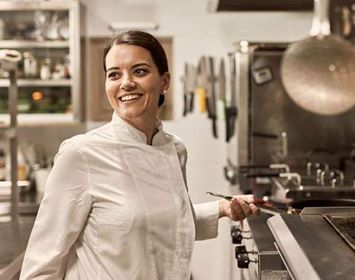Fotini Mitsou is a young passionate chef, who followed her strong desire for cooking, a dream from her childhood. She has graduated from the Chef D’oeuvre Cooking School in Athens; additionally she has attended many gastronomy seminars in Greece and abroad, in order to expand her knowledge. She has also participated in various cooking workshops. Furthermore, she has worked in hotels, such as AmanZoe/ Aman Resorts, the luxury villas Diles & Rinies and the Aeolis Tinos Suites. She also edited the dishes for the TV show “Yes Chef”. In this interview, she will describe aspects of food aesthetics.
Her greatest love; Japan! She is a lover of Japanese culture and food. In her spare time, you will find her reading mangas or trying new recipes.
You Might also Enjoy
A chef who knows the art of cooking well, will prepare a dish emerging all its flavors and ingredients. What do you consider to be the determining factors for food aesthetics or the aesthetic enjoyment of a meal?
The first and most important factor for me could not be other than the excellent raw ingredients. This greatly determines the aesthetic enjoyment of a dish. Ingredients’ quality determines the way we process it, and consequently the final result that will touch our palate. A second and decisive factor is the saying; “We eat first with our eyes”. The way in which we will present a meal, will highlight the percentage of food aesthetics, but also the creative character of the chef. For instance, the right size of a portion in the appropriate plate; the balance of protein and vegetables, as well as their correct placement without overshadowing the taste; all this gives the “make or break” to a dish.
Taste, as an experience, can place the pleasure of eating at the heart of the human experience. In a way, it shows how taste defines our tastes and our relationship with nature. It also pushes us towards ethical consumption practices. What is your opinion from your experience?
Admittedly, food is an integral human need, but this should not limit us to hastily covering it as a compulsion. By adding small elements, a chef can turn each dish into one unique personal experience, awakening a multitude set of special emotions and memories. Guided by our needs, everyday we seek or prepare food for consumption. At the same time, even unconsciously, we are in a constant attempt to balance nature and the world around us. Any exaggeration can bring, possibly irreparably, instability to this sensitive homeostasis. Apart from the pleasure, this can cost us our own well-being. For this reason, we must support the area that generously provides us raw ingredients; this ensures a balance in production and consumption. This also leads to properly adapting our dishes to inspire moderation, without sacrificing quality.
By observing the food habits of customers and listening to their relevant experiences, what could you share with us?
An intense phenomenon that I have noticed is the impact on the perception of taste through the presentation of a food from photos on various social media, which gradually influences and modifies the dietary choices of customers. We could perhaps call it a kind of “visual hunger“, which – relatively subconsciously – shapes consumer behavior, in a way “dictating” new trends that give weight to the “attractive” presentation of a restaurant’s dishes. The “challenge” of the chef is to offer the customer the feeling of good food, without using “tricks”. Those ‘tricks’ could alter or degrade the quality, related to the nutritional value, or the balance of flavors and elements. As consumers, we need to choose ingredients and foods every day; so, as we seek outward beauty, we should also be interested in the inward – as with humans!
If we were to talk about the aesthetics of everyday home cooking, what advice would you give?
Everyone can use elements of their character to each dish they prepare; they make it their own way and promote their own food aesthetics. You can easily find traditional grandmothers who cook excellent food, without ever having studied cooking; they succeed because they “put their heart” into what they make. The tradition and empirical advice are often passed on by word of mouth within families; that’s an valuable secret that must be kept from becoming a cliché and losing its “value”. In fact, anyone can adopt small daily “tricks” and give new life to the dishes he prepares, even at home. Internet is full of websites with useful suggestions and tips; so, we have the opportunity to try and evaluate, based on our skills and their degree of difficulty. Even the cooking shows in Greece and abroad have interesting “tips” that can inspire cooks of any level of experience. All we need to do is overcome our fears and say, “I can do that too!” Even if you do not achieve something the first time, with perseverance and patience everything is possible.
What are your future plans?
The good thing about a chef is that he can work anywhere in the world, giving joy and enjoyment to different cuisines. My goal is to keep my horizons open and take every opportunity to gain new knowledge and experiences; in that way, I can offer even more to all people I meet on my way.









4 Comments